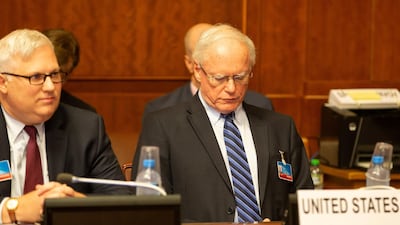Iranian presence in Syria is empowering ISIS in the region, Washington's special envoy to Syria told reporters on Wednesday.
In a telephone conference Ambassador James Jeffrey said the Trump administration will focus on pressuring Iran financially and contesting its activities in the region in a bid to push Tehran's military and proxies out of Syria.
“We see that [ISIS and Iran] are closely linked," said Mr Jeffrey. "ISIS to a large degree, certainly in Syria and Iraq, is based upon the populations - the Sunni Arab population," he added, alluding to Iranian influence in the Syrian and Iraqi governments and its effect on their respective disgruntled Sunni populations.
"Iran's encroachment into Arab areas gives no other alternative to pushing it out," Mr Jeffery said.
In Syria, Tehran joined Moscow and the Lebanese militant group Hezbollah in backing President Bashar Al Assad during the country's seven-year war.
Mr Jeffery stressed that Washington’s strategy would not involve the direct military targeting of Iranian soldiers and proxy groups. Instead, he said, the new list of sanctions against vital oil exports, banking and transport industries would squeeze the country's financial sector.
_________
Read more:
Comment: In Syria, Geir Pedersen faces an onerous but vital mission
Syrian ambassador to Lebanon calls for refugees to return
Syria's White Helmets: All we care about is saving lives
Comment: The tragedy that befell the Druze in Syria is a stark reminder of their solo battle for survival
_________
President Donald Trump in May pulled the US out of Iran's 2015 nuclear deal to curb what he said were Tehran's damaging activities in the region.
Washington, said Mr Jeffrey, would contest "more actively Iran's activities particularly in Iraq, Syria and Yemen."
The ambassador also linked the future withdrawal of American troops from Syria to the departure of Iranian forces from the country. Tehran enjoys influence in several countries in the region where it backs well-armed militias.
US policy is to ensure the enduring defeat of ISIS, work on a solution to the conflict under the terms of United Nations Security Council resolution 2254 and ensure all Iranian-commanded forces leave Syria entirely, he said.
Resolution 2254 is the main internationally-agreed upon document defining how to end the Syria war through a political transition.
"The US is pushing for the launch of a constitutional committee by end of December through the UN resolution of 2254 and to the regulation of a ceasefire," Mr Jeffrey said.
But Mr Al Assad has resisted previous attempts to end the conflict through political settlements, and has held on to power for over seven years with help from Iran and Russia. Both have helped turn the tide decisively in favour of Mr Al Assad, especially during the last three years, with rebel forces being routed out in many areas.
Washington says that a continuation of Mr Al Assad’s regime will not lead to a political settlement.
US will only cooperate with a Syrian government that does not drive half of its population away, does not wage a criminal war on its people, does not use chemical weapons and does not threaten its neighbours or provides a base for Iranian power projection, he said.
"If they show us a Syrian government that could meet this criteria, then that would be a Syrian government that we can work with," said Mr Jeffrey.

